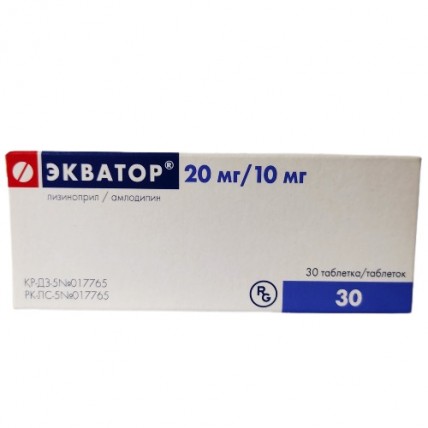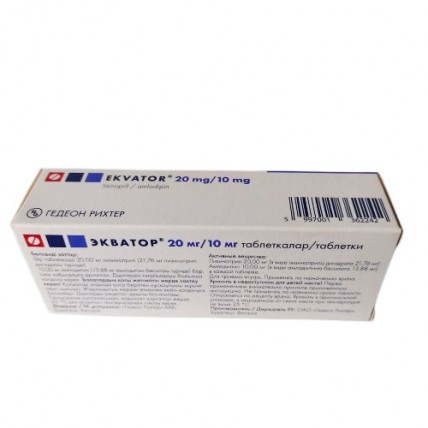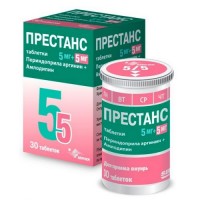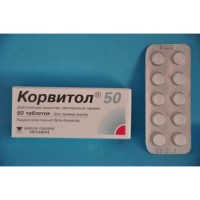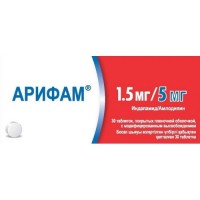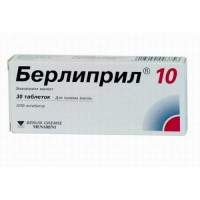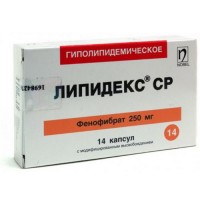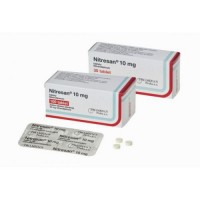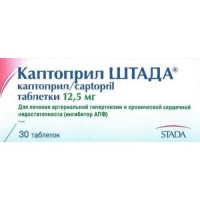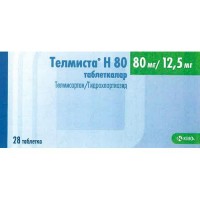Ekvator® (Lisinopril + Amlodipine) 20 mg/10 mg (30 tablets)
- $33.20
Sku:
289d7d517e8b
Brand:
Gedeon Richter (Hungary)
Ekvator® (Lisinopril + Amlodipine) is a medication used to treat high blood pressure. It is a combination of Lisinopril an ACE inhibitor with Amlodipine a calcium channel blocker. It may be used when blood pressure is not well controlled with each of the two agents alone.
Common brand names: Lisonorm, Amesos, Dironorm, Alis, Amdepin-L, Calchek-L, Inace, Numlo-L, Zelis-AM, Primodil-L
One tablet contains active substances: Lisinopril dihydrate 21.76 mg (equivalent to lisinopril 20 mg), Amlodipine besylate 13.88 mg (equivalent to amlodipine 10 mg)
Excipients: microcrystalline cellulose 101, microcrystalline cellulose 12, sodium starch glycolate (type A), magnesium stearate.
Inside, regardless of the meal. The recommended dose is one Equator® 20/10 mg tablet daily. The maximum daily dose is one Equator® 20/10 mg tablet.
Patients with renal impairment
Equator® is indicated only for those patients in whom the optimal maintenance dose of lisinopril and amlodipine is titrated: up to 20 and 10 mg, respectively. During treatment with Equator®, it is necessary to monitor renal function, the concentration of potassium and sodium in the blood serum. In case of deterioration of renal function, taking Equator® should be canceled and replaced with monopreparations in adequate doses.
Patients with hepatic impairment
The elimination of amlodipine may be slowed down in patients with impaired liver function. There are no clear recommendations on the dosage regimen in such cases, so this drug should be used with caution in patients with hepatic impairment.
Elderly patients (over 65)
Equator® is indicated only for those patients in whom the optimal maintenance dose of lisinopril and amlodipine is titrated: up to 20 and 10 mg, respectively.
Often
- dizziness, headache, drowsiness
- dry cough that stops when the drug is discontinued
- weakness, diarrhea, nausea, vomiting, change in taste
- orthostatic hypotension
- itching, skin rashes, swelling, redness of the facial skin
Infrequently
- pain in the chest, back, arthralgia, myalgia, tonic muscle cramps
- mood changes, sleep disturbances
- hypersensitivity / angioedema of the face, limbs, lips, epiglottis and larynx
- agranulocytosis, a slight decrease in hemoglobin and hematocrit levels with prolonged use of the drug
- hyperkalemia
- an increase in the level of creatinine, urea, residual nitrogen, an increase in the activity of liver enzymes and the level of bilirubin in the blood serum, especially if there is a history of kidney disease, diabetes mellitus or renovascular hypertension
- paresthesia, hyperesthesia, fatigue, asthenia, tremor,
- visual disturbances, tinnitus
- disorders of cerebral circulation, Raynaud's phenomenon, fainting
- bronchospasm, allergic alveolitis, dyspnea
- rhinitis
- dyspepsia, increased frequency of bowel movements
- increase or decrease in body weight
- nocturia, gynecomastia
Seldom
- tachycardia (probably as a result of excessive hypotension in patients with an increased risk of myocardial infarction and cerebral stroke)
- indigestion, dry mouth, abdominal pain, pancreatitis, hepatocellular or cholestatic jaundice, hepatitis, hypertrophied gingivitis
- swelling, sweating
- pruritus, psoriasis, urticaria rash, alopecia
- impaired renal function, polyguria, anuria, acute renal failure, uremia, proteinuria, impotence
- hyponatremia
Rarely
- oppression of bone marrow hematopoiesis: leukopenia, neutropenia, thrombocytopenia; hemolytic anemia, increased ESR, eosinophilia, leukocytosis, lymphadenopathy
- hypoglycemia, hyperglycemia
- autoimmune disorders
- peripheral neuropathy
- myocardial infarction, ventricular tachycardia, atrial fibrillation, arrhythmias, vasculitis
- eosinophilic pneumonia, sinusitis
- toxic epidermal necrolysis, Stevens-Johnson syndrome, erythema multiforme, pemphigus vulgaris, photosensitivity,
- liver failure
- increased level of antinuclear antibodies
- hypersensitivity to lisinopril or other ACE inhibitors
- hypersensitivity to amlodipine or other dihydropyridine derivatives
- hypersensitivity to auxiliary components of the drug
- severe arterial hypotension
- a history of angioedema during therapy with ACE inhibitors
- hereditary or idiopathic angioedema
- hemodynamically significant aortic stenosis, mitral stenosis, hypertrophic obstructive cardiomyopathy, cardiogenic shock
- heart failure after acute myocardial infarction (within the first 28 days)
- unstable angina (with the exception of Prinzmetal's angina)
- pregnancy and lactation
- children and adolescents up to 18 years of age (due to insufficient data on safety and effectiveness)
Lisinopril
Substances that affect potassium levels: Potassium-sparing diuretics (such as spironolactone, amiloride and triamterene), potassium supplements, potassium-containing salt substitutes, and other medications that increase serum potassium (such as heparin) can lead to hyperkalemia in combined with ACE inhibitors, especially in patients with renal failure and other kidney disease. When prescribing a drug that affects the level of potassium, along with lisinopril, the level of potassium in the serum should be monitored. Therefore, concomitant administration should be carefully justified and made with extreme caution and regular monitoring of both serum potassium levels and renal function. Potassium-sparing diuretics can be taken together with Equator® only under strict medical supervision.
Diuretics: in the case of prescribing a diuretic to a patient receiving Equator®, the antihypertensive effect, as a rule, increases, it is necessary to take Equator® in combination with diuretics with extreme caution. Lisinopril softens the potassium uretic effect of diuretics.
Other antihypertensive drugs: the simultaneous use of these drugs can enhance the antihypertensive effect of Ekvator®. Concomitant use with nitroglycerin or other nitrates or vasodilators can lead to a greater decrease in blood pressure.
Tricyclic antidepressants / antipsychotics / anesthetics / narcotics: Concomitant use of these drugs with ACE inhibitors can lead to a greater decrease in blood pressure.
Alcohol enhances the hypotensive effect of Ekvator®.
Allopurinol, procainamide, systemic glucocorticosteroids, cytostatics can lead to an increased risk of developing leukopenia, when administered simultaneously with ACE inhibitors.
Immunosuppressive drugs, when administered concomitantly with ACE inhibitors, may lead to an increased risk of transplant rejection.
Antacids: when taken simultaneously with ACE inhibitors, they reduce the bioavailability of the latter.
Sympathomimetics: May reduce the antihypertensive effect of ACE inhibitors; it is necessary to carefully monitor the achievement of the desired effect.
Hypoglycemic drugs: while taking ACE inhibitors and hypoglycemic drugs (insulins and oral hypoglycemic drugs), the likelihood of lowering blood glucose levels and the risk of hypoglycemia may increase. This phenomenon is most often observed during the first week of combination treatment and in patients with renal insufficiency.
Non-steroidal anti-inflammatory drugs (NSAIDs): Long-term administration of NSAIDs, including high doses of acetylsalicylic acid> 3 g / day, may reduce the antihypertensive effect of ACE inhibitors. The additive effect of taking NSAIDs and ACE inhibitors is manifested in an increase in serum potassium levels and can lead to a deterioration in renal function.
Lithium: the excretion of lithium may be slowed down during concomitant use with ACE inhibitors and therefore the concentration of lithium in the blood serum should be monitored during this period.
Amlodipine
Inhibitors of CYP3A4: studies in elderly patients have shown that diltiazem inhibits the metabolism of amlodipine, probably through CYP3A4 (plasma concentration increases by almost 50% and the effect of amlodipine is increased). It cannot be ruled out that stronger CYP3F4 inhibitors (i.e., ketoconazole, itraconazole, ritonavir) may increase serum amlodipine levels to a greater extent than diltiazem. Simultaneous appointment should be carried out with caution.
Inducers of CYP3A4: simultaneous administration with anticonvulsants (for example, carbamazepine, phenobarbital, phenytoin, fophenytoin, primidone), rifampicin, herbal preparations containing St. John's wort (Hypericum perforatum) can lead to a decrease in the concentration of amlodipine in the blood plasma. Clinical control is shown with a possible dose adjustment of amlodipine during treatment with inducers and after their cancellation. Simultaneous use should be carried out with caution.
Other: as a monotherapy, amlodipine is well combined with thiazide diuretics, beta-blockers, ACE inhibitors, long-acting nitrates, sublingual nitroglycerin, digoxin, warfarin, atorvastatin, sildenafil, antacids (aluminum hydroxide, magnesium, hydroxide, cymethyster) drugs, antibiotics and oral hypoglycemic drugs.
It is necessary to inform the doctor about taking the drug Equator® before the general or local anesthesia is performed, because the latter is a risk factor for a short-term drop in blood pressure
Arterial hypotension with clinical manifestations
A significant decrease in blood pressure with the development of clinical symptoms can be observed in patients with a decrease in circulating blood volume and / or sodium content due to taking diuretics, fluid loss or other reasons, for example, with profuse sweating, prolonged vomiting and / or diarrhea. In case of arterial hypotension, fluid loss should be replenished (intravenous infusion of saline) if necessary. It is preferred that the restoration of fluid and / or sodium loss is carried out prior to the initiation of Equator® therapy. It is necessary to monitor of the parameters of the antihypertensive effect after the introduction of the initial dose.
Impaired renal function
In several patients with arterial hypertension without pronounced manifestations of renovascular diseases, an increase in blood levels of urea and serum creatinine was observed, in most cases minimal or transient, more pronounced while taking ACE inhibitors and a diuretic. This is most common in patients with a history of kidney disease.
In some patients with bilateral renal artery stenosis or with renal artery stenosis of a single kidney, who received ACE inhibitors, an increase in blood levels of urea and serum creatinine was observed, as a rule, reversible after discontinuation of the drug. Such changes are especially common in patients with renal insufficiency. To determine the optimal maintenance dose, the dosage regimen must be determined individually, using lisinopril and amlodipine separately. Equator® is indicated only for those patients in whom the optimal maintenance dose of lisinopril and amlodipine is titrated in the case of Equator® 20/10 mg in a tablet: up to 20 and 10 mg, respectively.
In case of deterioration of renal function, taking Equator® should be canceled and replaced with monotherapy with drugs in adequate doses.
Angioedema
Angioneurotic edema of the face, limbs, lips, tongue, glottis and / or larynx has been reported in patients taking ACE inhibitors, including lisinopril. In these cases, taking Equator® should be stopped immediately and the patient should be closely monitored until the symptoms disappear completely.
Swelling of the face, lips and extremities usually goes away on its own, however, antihistamines should be used to reduce the severity of symptoms.
Angioneurotic edema, accompanied by laryngeal edema, can be fatal. If swelling of the tongue, pharynx or larynx is detected, which is the cause of airway obstruction, it is necessary to urgently start emergency measures. Appropriate measures include: subcutaneous administration of 0.3 to 0.5 mg or slow intravenous administration of 0.1 mg 0.1% epinephrine solution (epinephrine), intravenous administration of glucocorticosteroids and antihistamines while monitoring vital functions.
Edema of the wall of the gastrointestinal tract was rare in patients taking ACE inhibitors. These patients complained of abdominal pain (with or without nausea and vomiting); in some cases, prior facial edema was not observed and the level of C-1-esterase was within normal limits. Angioneurotic edema was diagnosed by computed tomography, or after ultrasound, or after surgery, the symptoms disappeared after stopping the ACE inhibitor. Edema of the wall of the gastrointestinal tract should be included in the differential-diagnostic series of abdominal pain in patients taking ACE inhibitors.
Anaphylactic reactions in hemodialysis patients
In patients who underwent hemodialysis through a polyacrylonitrile membrane (for example, AN 69) and who simultaneously received ACE inhibitors, cases of anaphylactic shock have been reported, so this combination should be avoided. Patients are advised to use either another type of dialysis membrane, or a different class of antihypertensive drug.
Anaphylactic reactions in patients during apheresis of low-density lipoprotein (LDL)
Rarely, life-threatening anaphylactic reactions have developed in patients treated with ACE inhibitors during low-density lipoprotein (LDL) apheresis with dextran sulfate. Such reactions were prevented by abstaining from taking ACE inhibitors before each apheresis procedure.
Desensitization from wasp or bee venom
Sometimes in patients taking ACE inhibitors, anaphylactic reactions developed during desensitization with wasp or bee venom. In these cases, you must first temporarily interrupt treatment with an ACE inhibitor.
Hepatotoxicity
In rare cases, the use of ACE inhibitors was accompanied by a syndrome that began with cholestatic jaundice or hepatitis and developed into fulminant necrosis and, in several cases, was fatal. The mechanism of this syndrome is unclear. Patients receiving Equator®, and who develop jaundice or have a significant increase in the activity of liver enzymes, should cancel Equator®, followed by monitoring of their condition.
In patients with impaired liver function, the half-life of amlodipine is lengthened.
Hematologic toxicity
In rare cases, neutropenia, agranulocytosis, thrombocytopenia, and anemia have been reported in patients treated with ACE inhibitors. In patients with normal renal function and no other aggravating factors, neutropenia is rare. Neutropenia and agranulocytosis are reversible and disappear after the withdrawal of the ACE inhibitor. Equator® should be used with extreme caution in patients with vascular collagenosis, during immunosuppressive therapy, during treatment with allopurinol or procainamide, or with a combination of these aggravating factors, especially in the presence of a previous impairment of renal function. Some of these patients developed serious infectious diseases, which in a few cases were not corrected with antibiotic therapy. When prescribing Equator®, it is recommended to periodically monitor the level of leukocytes in such patients, as well as warn them about the need to report the first signs of an infectious disease.
Surgery / general anesthesia
In patients undergoing major surgery or during anesthesia with drugs that lead to hypotension, lisinopril can block the formation of angiotensin II after compensatory release of renin. If hypotension develops, probably as a result of the above mechanism, correction can be made by increasing the volume of circulating fluid.
Elderly patients
Elderly patients with impaired renal function should adjust the dose of Equator®.
Hyperkalemia
An increase in serum potassium was observed in some patients treated with ACE inhibitors. The risk group for the development of hyperkalemia includes patients with renal failure, diabetes mellitus, acute heart failure, dehydration, metabolic acidosis, or while taking potassium-sparing diuretics, potassium supplements, potassium-containing salt substitutes, or any other medications that increase serum potassium levels blood (for example, heparin). If it is necessary to take it simultaneously with the above drugs, it is necessary to control the level of potassium in the blood serum.
Equator® is prescribed with caution in liver failure, renal failure, in case of insufficient cerebral circulation, in old age, with hemodynamically insignificant aortic and mitral stenosis, collagenosis, inhibition of bone marrow hematopoiesis, hyperkalemia, condition after kidney transplantation, in severe autoimmune , scleroderma), with severe bradycardia and tachycardia.
Features of the impact on the ability to drive a vehicle and potentially dangerous mechanisms
Equator ® can affect the ability to drive and operate machinery, especially at the beginning of treatment, when the risk of arterial hypotension is more likely. The dose and dosing regimen at which you can drive a car and perform work associated with an increased risk of injury are set individually.
Symptoms: excessive peripheral vasodilation with severe arterial hypotension, acute vascular insufficiency, electrolyte imbalance, renal failure, hyperventilation, tachycardia, bradycardia, dizziness, anxiety and cough.
Treatment: symptomatic, aimed at maintaining heart function, blood pressure levels, water and electrolyte balance. In case of significant hypotension, an elevated position of the lower extremities is necessary; if the introduction of fluid has not led to a sufficient result, supportive therapy with intravenous dopamine may be required until the main indicators return to normal. Treatment with angiotensin II is also considered if available. Intravenous administration of calcium gluconate can have a positive effect on the reversal of the effects caused by calcium channel blockade.
Since amlodipine is absorbed slowly, gastric lavage may be effective in some cases.
Lisinopril can be removed from the systemic circulation by hemodialysis. Amlodipine, however, binds well to proteins and therefore dialysis is ineffective.
Store in its original packaging at temperatures between + 15 ° C and + 30 ° C, protected from light.
Keep out of the reach of children!
Shelf life - 2 years
Do not use after the expiration date!
Common brand names: Lisonorm, Amesos, Dironorm, Alis, Amdepin-L, Calchek-L, Inace, Numlo-L, Zelis-AM, Primodil-L
Composition
One tablet contains active substances: Lisinopril dihydrate 21.76 mg (equivalent to lisinopril 20 mg), Amlodipine besylate 13.88 mg (equivalent to amlodipine 10 mg)
Excipients: microcrystalline cellulose 101, microcrystalline cellulose 12, sodium starch glycolate (type A), magnesium stearate.
Uses of Ekvator® (Lisinopril + Amlodipine)
- Essential arterial hypertension
Method of administration and dosage
Inside, regardless of the meal. The recommended dose is one Equator® 20/10 mg tablet daily. The maximum daily dose is one Equator® 20/10 mg tablet.
Patients with renal impairment
Equator® is indicated only for those patients in whom the optimal maintenance dose of lisinopril and amlodipine is titrated: up to 20 and 10 mg, respectively. During treatment with Equator®, it is necessary to monitor renal function, the concentration of potassium and sodium in the blood serum. In case of deterioration of renal function, taking Equator® should be canceled and replaced with monopreparations in adequate doses.
Patients with hepatic impairment
The elimination of amlodipine may be slowed down in patients with impaired liver function. There are no clear recommendations on the dosage regimen in such cases, so this drug should be used with caution in patients with hepatic impairment.
Elderly patients (over 65)
Equator® is indicated only for those patients in whom the optimal maintenance dose of lisinopril and amlodipine is titrated: up to 20 and 10 mg, respectively.
Side effects of Ekvator® (Lisinopril + Amlodipine)
Often
- dizziness, headache, drowsiness
- dry cough that stops when the drug is discontinued
- weakness, diarrhea, nausea, vomiting, change in taste
- orthostatic hypotension
- itching, skin rashes, swelling, redness of the facial skin
Infrequently
- pain in the chest, back, arthralgia, myalgia, tonic muscle cramps
- mood changes, sleep disturbances
- hypersensitivity / angioedema of the face, limbs, lips, epiglottis and larynx
- agranulocytosis, a slight decrease in hemoglobin and hematocrit levels with prolonged use of the drug
- hyperkalemia
- an increase in the level of creatinine, urea, residual nitrogen, an increase in the activity of liver enzymes and the level of bilirubin in the blood serum, especially if there is a history of kidney disease, diabetes mellitus or renovascular hypertension
- paresthesia, hyperesthesia, fatigue, asthenia, tremor,
- visual disturbances, tinnitus
- disorders of cerebral circulation, Raynaud's phenomenon, fainting
- bronchospasm, allergic alveolitis, dyspnea
- rhinitis
- dyspepsia, increased frequency of bowel movements
- increase or decrease in body weight
- nocturia, gynecomastia
Seldom
- tachycardia (probably as a result of excessive hypotension in patients with an increased risk of myocardial infarction and cerebral stroke)
- indigestion, dry mouth, abdominal pain, pancreatitis, hepatocellular or cholestatic jaundice, hepatitis, hypertrophied gingivitis
- swelling, sweating
- pruritus, psoriasis, urticaria rash, alopecia
- impaired renal function, polyguria, anuria, acute renal failure, uremia, proteinuria, impotence
- hyponatremia
Rarely
- oppression of bone marrow hematopoiesis: leukopenia, neutropenia, thrombocytopenia; hemolytic anemia, increased ESR, eosinophilia, leukocytosis, lymphadenopathy
- hypoglycemia, hyperglycemia
- autoimmune disorders
- peripheral neuropathy
- myocardial infarction, ventricular tachycardia, atrial fibrillation, arrhythmias, vasculitis
- eosinophilic pneumonia, sinusitis
- toxic epidermal necrolysis, Stevens-Johnson syndrome, erythema multiforme, pemphigus vulgaris, photosensitivity,
- liver failure
- increased level of antinuclear antibodies
Contraindications of Ekvator® (Lisinopril + Amlodipine)
- hypersensitivity to lisinopril or other ACE inhibitors
- hypersensitivity to amlodipine or other dihydropyridine derivatives
- hypersensitivity to auxiliary components of the drug
- severe arterial hypotension
- a history of angioedema during therapy with ACE inhibitors
- hereditary or idiopathic angioedema
- hemodynamically significant aortic stenosis, mitral stenosis, hypertrophic obstructive cardiomyopathy, cardiogenic shock
- heart failure after acute myocardial infarction (within the first 28 days)
- unstable angina (with the exception of Prinzmetal's angina)
- pregnancy and lactation
- children and adolescents up to 18 years of age (due to insufficient data on safety and effectiveness)
Drug interactions of Ekvator® (Lisinopril + Amlodipine)
Lisinopril
Substances that affect potassium levels: Potassium-sparing diuretics (such as spironolactone, amiloride and triamterene), potassium supplements, potassium-containing salt substitutes, and other medications that increase serum potassium (such as heparin) can lead to hyperkalemia in combined with ACE inhibitors, especially in patients with renal failure and other kidney disease. When prescribing a drug that affects the level of potassium, along with lisinopril, the level of potassium in the serum should be monitored. Therefore, concomitant administration should be carefully justified and made with extreme caution and regular monitoring of both serum potassium levels and renal function. Potassium-sparing diuretics can be taken together with Equator® only under strict medical supervision.
Diuretics: in the case of prescribing a diuretic to a patient receiving Equator®, the antihypertensive effect, as a rule, increases, it is necessary to take Equator® in combination with diuretics with extreme caution. Lisinopril softens the potassium uretic effect of diuretics.
Other antihypertensive drugs: the simultaneous use of these drugs can enhance the antihypertensive effect of Ekvator®. Concomitant use with nitroglycerin or other nitrates or vasodilators can lead to a greater decrease in blood pressure.
Tricyclic antidepressants / antipsychotics / anesthetics / narcotics: Concomitant use of these drugs with ACE inhibitors can lead to a greater decrease in blood pressure.
Alcohol enhances the hypotensive effect of Ekvator®.
Allopurinol, procainamide, systemic glucocorticosteroids, cytostatics can lead to an increased risk of developing leukopenia, when administered simultaneously with ACE inhibitors.
Immunosuppressive drugs, when administered concomitantly with ACE inhibitors, may lead to an increased risk of transplant rejection.
Antacids: when taken simultaneously with ACE inhibitors, they reduce the bioavailability of the latter.
Sympathomimetics: May reduce the antihypertensive effect of ACE inhibitors; it is necessary to carefully monitor the achievement of the desired effect.
Hypoglycemic drugs: while taking ACE inhibitors and hypoglycemic drugs (insulins and oral hypoglycemic drugs), the likelihood of lowering blood glucose levels and the risk of hypoglycemia may increase. This phenomenon is most often observed during the first week of combination treatment and in patients with renal insufficiency.
Non-steroidal anti-inflammatory drugs (NSAIDs): Long-term administration of NSAIDs, including high doses of acetylsalicylic acid> 3 g / day, may reduce the antihypertensive effect of ACE inhibitors. The additive effect of taking NSAIDs and ACE inhibitors is manifested in an increase in serum potassium levels and can lead to a deterioration in renal function.
Lithium: the excretion of lithium may be slowed down during concomitant use with ACE inhibitors and therefore the concentration of lithium in the blood serum should be monitored during this period.
Amlodipine
Inhibitors of CYP3A4: studies in elderly patients have shown that diltiazem inhibits the metabolism of amlodipine, probably through CYP3A4 (plasma concentration increases by almost 50% and the effect of amlodipine is increased). It cannot be ruled out that stronger CYP3F4 inhibitors (i.e., ketoconazole, itraconazole, ritonavir) may increase serum amlodipine levels to a greater extent than diltiazem. Simultaneous appointment should be carried out with caution.
Inducers of CYP3A4: simultaneous administration with anticonvulsants (for example, carbamazepine, phenobarbital, phenytoin, fophenytoin, primidone), rifampicin, herbal preparations containing St. John's wort (Hypericum perforatum) can lead to a decrease in the concentration of amlodipine in the blood plasma. Clinical control is shown with a possible dose adjustment of amlodipine during treatment with inducers and after their cancellation. Simultaneous use should be carried out with caution.
Other: as a monotherapy, amlodipine is well combined with thiazide diuretics, beta-blockers, ACE inhibitors, long-acting nitrates, sublingual nitroglycerin, digoxin, warfarin, atorvastatin, sildenafil, antacids (aluminum hydroxide, magnesium, hydroxide, cymethyster) drugs, antibiotics and oral hypoglycemic drugs.
It is necessary to inform the doctor about taking the drug Equator® before the general or local anesthesia is performed, because the latter is a risk factor for a short-term drop in blood pressure
Special precautions for Ekvator® (Lisinopril + Amlodipine)
Arterial hypotension with clinical manifestations
A significant decrease in blood pressure with the development of clinical symptoms can be observed in patients with a decrease in circulating blood volume and / or sodium content due to taking diuretics, fluid loss or other reasons, for example, with profuse sweating, prolonged vomiting and / or diarrhea. In case of arterial hypotension, fluid loss should be replenished (intravenous infusion of saline) if necessary. It is preferred that the restoration of fluid and / or sodium loss is carried out prior to the initiation of Equator® therapy. It is necessary to monitor of the parameters of the antihypertensive effect after the introduction of the initial dose.
Impaired renal function
In several patients with arterial hypertension without pronounced manifestations of renovascular diseases, an increase in blood levels of urea and serum creatinine was observed, in most cases minimal or transient, more pronounced while taking ACE inhibitors and a diuretic. This is most common in patients with a history of kidney disease.
In some patients with bilateral renal artery stenosis or with renal artery stenosis of a single kidney, who received ACE inhibitors, an increase in blood levels of urea and serum creatinine was observed, as a rule, reversible after discontinuation of the drug. Such changes are especially common in patients with renal insufficiency. To determine the optimal maintenance dose, the dosage regimen must be determined individually, using lisinopril and amlodipine separately. Equator® is indicated only for those patients in whom the optimal maintenance dose of lisinopril and amlodipine is titrated in the case of Equator® 20/10 mg in a tablet: up to 20 and 10 mg, respectively.
In case of deterioration of renal function, taking Equator® should be canceled and replaced with monotherapy with drugs in adequate doses.
Angioedema
Angioneurotic edema of the face, limbs, lips, tongue, glottis and / or larynx has been reported in patients taking ACE inhibitors, including lisinopril. In these cases, taking Equator® should be stopped immediately and the patient should be closely monitored until the symptoms disappear completely.
Swelling of the face, lips and extremities usually goes away on its own, however, antihistamines should be used to reduce the severity of symptoms.
Angioneurotic edema, accompanied by laryngeal edema, can be fatal. If swelling of the tongue, pharynx or larynx is detected, which is the cause of airway obstruction, it is necessary to urgently start emergency measures. Appropriate measures include: subcutaneous administration of 0.3 to 0.5 mg or slow intravenous administration of 0.1 mg 0.1% epinephrine solution (epinephrine), intravenous administration of glucocorticosteroids and antihistamines while monitoring vital functions.
Edema of the wall of the gastrointestinal tract was rare in patients taking ACE inhibitors. These patients complained of abdominal pain (with or without nausea and vomiting); in some cases, prior facial edema was not observed and the level of C-1-esterase was within normal limits. Angioneurotic edema was diagnosed by computed tomography, or after ultrasound, or after surgery, the symptoms disappeared after stopping the ACE inhibitor. Edema of the wall of the gastrointestinal tract should be included in the differential-diagnostic series of abdominal pain in patients taking ACE inhibitors.
Anaphylactic reactions in hemodialysis patients
In patients who underwent hemodialysis through a polyacrylonitrile membrane (for example, AN 69) and who simultaneously received ACE inhibitors, cases of anaphylactic shock have been reported, so this combination should be avoided. Patients are advised to use either another type of dialysis membrane, or a different class of antihypertensive drug.
Anaphylactic reactions in patients during apheresis of low-density lipoprotein (LDL)
Rarely, life-threatening anaphylactic reactions have developed in patients treated with ACE inhibitors during low-density lipoprotein (LDL) apheresis with dextran sulfate. Such reactions were prevented by abstaining from taking ACE inhibitors before each apheresis procedure.
Desensitization from wasp or bee venom
Sometimes in patients taking ACE inhibitors, anaphylactic reactions developed during desensitization with wasp or bee venom. In these cases, you must first temporarily interrupt treatment with an ACE inhibitor.
Hepatotoxicity
In rare cases, the use of ACE inhibitors was accompanied by a syndrome that began with cholestatic jaundice or hepatitis and developed into fulminant necrosis and, in several cases, was fatal. The mechanism of this syndrome is unclear. Patients receiving Equator®, and who develop jaundice or have a significant increase in the activity of liver enzymes, should cancel Equator®, followed by monitoring of their condition.
In patients with impaired liver function, the half-life of amlodipine is lengthened.
Hematologic toxicity
In rare cases, neutropenia, agranulocytosis, thrombocytopenia, and anemia have been reported in patients treated with ACE inhibitors. In patients with normal renal function and no other aggravating factors, neutropenia is rare. Neutropenia and agranulocytosis are reversible and disappear after the withdrawal of the ACE inhibitor. Equator® should be used with extreme caution in patients with vascular collagenosis, during immunosuppressive therapy, during treatment with allopurinol or procainamide, or with a combination of these aggravating factors, especially in the presence of a previous impairment of renal function. Some of these patients developed serious infectious diseases, which in a few cases were not corrected with antibiotic therapy. When prescribing Equator®, it is recommended to periodically monitor the level of leukocytes in such patients, as well as warn them about the need to report the first signs of an infectious disease.
Surgery / general anesthesia
In patients undergoing major surgery or during anesthesia with drugs that lead to hypotension, lisinopril can block the formation of angiotensin II after compensatory release of renin. If hypotension develops, probably as a result of the above mechanism, correction can be made by increasing the volume of circulating fluid.
Elderly patients
Elderly patients with impaired renal function should adjust the dose of Equator®.
Hyperkalemia
An increase in serum potassium was observed in some patients treated with ACE inhibitors. The risk group for the development of hyperkalemia includes patients with renal failure, diabetes mellitus, acute heart failure, dehydration, metabolic acidosis, or while taking potassium-sparing diuretics, potassium supplements, potassium-containing salt substitutes, or any other medications that increase serum potassium levels blood (for example, heparin). If it is necessary to take it simultaneously with the above drugs, it is necessary to control the level of potassium in the blood serum.
Equator® is prescribed with caution in liver failure, renal failure, in case of insufficient cerebral circulation, in old age, with hemodynamically insignificant aortic and mitral stenosis, collagenosis, inhibition of bone marrow hematopoiesis, hyperkalemia, condition after kidney transplantation, in severe autoimmune , scleroderma), with severe bradycardia and tachycardia.
Features of the impact on the ability to drive a vehicle and potentially dangerous mechanisms
Equator ® can affect the ability to drive and operate machinery, especially at the beginning of treatment, when the risk of arterial hypotension is more likely. The dose and dosing regimen at which you can drive a car and perform work associated with an increased risk of injury are set individually.
Overdose
Symptoms: excessive peripheral vasodilation with severe arterial hypotension, acute vascular insufficiency, electrolyte imbalance, renal failure, hyperventilation, tachycardia, bradycardia, dizziness, anxiety and cough.
Treatment: symptomatic, aimed at maintaining heart function, blood pressure levels, water and electrolyte balance. In case of significant hypotension, an elevated position of the lower extremities is necessary; if the introduction of fluid has not led to a sufficient result, supportive therapy with intravenous dopamine may be required until the main indicators return to normal. Treatment with angiotensin II is also considered if available. Intravenous administration of calcium gluconate can have a positive effect on the reversal of the effects caused by calcium channel blockade.
Since amlodipine is absorbed slowly, gastric lavage may be effective in some cases.
Lisinopril can be removed from the systemic circulation by hemodialysis. Amlodipine, however, binds well to proteins and therefore dialysis is ineffective.
Storage conditions
Store in its original packaging at temperatures between + 15 ° C and + 30 ° C, protected from light.
Keep out of the reach of children!
Shelf life - 2 years
Do not use after the expiration date!
